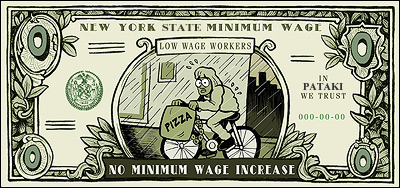 All New Yorkers have had to brave record low temperatures, wind, snow, sleet and rain this winter. But for Joaquim Gonzalez and thousands of other delivery people throughout New York City the past several weeks have been particularly harsh. They have had to battle the cold, slush and ice for between seven and ten hours a day, six or seven days each week. And no matter how much Gonzalez works, he still cannot get ahead.
All New Yorkers have had to brave record low temperatures, wind, snow, sleet and rain this winter. But for Joaquim Gonzalez and thousands of other delivery people throughout New York City the past several weeks have been particularly harsh. They have had to battle the cold, slush and ice for between seven and ten hours a day, six or seven days each week. And no matter how much Gonzalez works, he still cannot get ahead.
He earns the minimum wage for tipped workers: $3.30 an hour. (Workers who do not have the opportunity for tips must be paid at least $5.15.) That means eight hours of biking around snowy, crowded Manhattan streets guarantees him a mere $26.40. Sometimes he lucks out and gets a few good tips. Other times he doesn't. Last month, Gonzalez rode his bicycle more than 70 blocks in the snow for a 50-cent tip. After paying for rent, food, subway, clothes, medicine, and maintenance of his bicycle, Gonzalez is left with almost nothing.
Gonzalez, like other minimum wage workers throughout New York State, is getting a raw deal. Unlike a growing number of states, New York has failed to take action to fix the problem of a stagnant and inadequate federal minimum wage by increasing the state minimum wage.
Since 1968, the purchasing power of the federal minimum wage has fallen by 40 percent. Throughout the 1960s and 70s, a full-time, year-round worker earning minimum wage could keep a family of three above the poverty line. Today, a full-time, year-round worker earning minimum wage can barely get his or her family three quarters of the way out of poverty.
Inflation has eroded the value of the dollar, and the minimum wage has failed to keep up. In the end, the New York State government is not all that different from the woman who tipped Gonzalez 50 cents. It is undervaluing its workers and doing the very least it can get away with.
Nationally, low-wage workers' real wages (taking inflation into account) increased by 5.5 percent between 1989 and 1999, but New York State's low-wage workers saw their real wages fall by 5.5 percent over the same period. Similarly, poverty declined in the United States during the 1990s, but it increased in New York State, as the income gap between rich and poor New Yorkers grew dramatically.
Governor George Pataki's proposed 2004-2005 executive budget does nothing to fix the problems of low-wage workers. In fact, Pataki's proposals would make the situation worse. The governor has proposed reducing food and living allowances for long-term welfare recipients, even though inflation continues to decimate the value of New York State's welfare grant.
Scapegoating the poorest of the poor, though, is nothing new. What is remarkable is that Governor Pataki's budget fails to reward work in any meaningful way. In fact, he has proposed a reduction in the amount of earned income that working welfare recipients can keep before losing benefits, thereby creating a disincentive to work. Additionally, his continued failure to increase New York State's minimum wage to keep up with inflation, and keep it pegged to inflation in the future, punishes hard-working New Yorkers.
New York is full of people who face rough labor conditions and the daily indignity of struggling to survive. Their treatment affects all of us. Poverty wages for workers translates into fewer consumers for business. When under-paid workers get sick, the government -- in other words, the taxpayer -- gets stuck with the bill.
New York's neighbors in Connecticut and Massachusetts have already raised their minimum wages to $6.90 and $6.75 per hour respectively, and neither state has experienced job losses as a result. Moreover, research done in California suggests that a higher minimum wage has important secondary benefits, such as improved health for low-wage workers and a greater likelihood that their children will graduate from high school.
It is high time for New York to join the growing number of states and the District of Columbia that have raised the minimum wage above the federal minimum of $5.15 per hour. Governor Pataki should support legislation currently pending in the State Assembly that would strengthen enforcement of minimum wage violations and raise the minimum wage by almost $2. This legislation would directly benefit more than 500,000 New Yorkers, and indirectly benefit many more, while saving the state money and giving the economy a boost. Joaquim Gonzalez, like all of New York State's minimum wage workers, deserves a raise.
Andrew Friedman is a senior fellow of the Drum Major Institute for Public Policy; Fernando Ferrer, former Bronx borough president and candidate for mayor, is president of the institute.
#####
Related Story:
A Minimum Wage Increase Will Hurt Small Business and the Working Poor
by Mark Alesse and Matthew Guilbault




